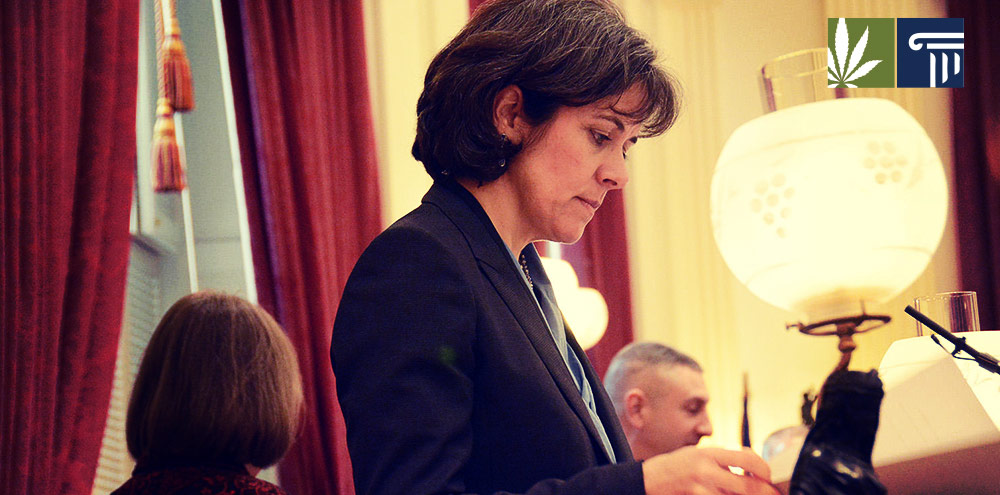The Speaker of the Vermont House of Representatives said the legislature will look again at a bill to tax and regulate marijuana sales later this year, but that for now lawmakers must focus their attention on the state’s response to the COVID-19 pandemic.
House Speaker Mitzi Johnson (D) made the remarks in an interview with Vermont Public Radio when asked why lawmakers had not continued to pursue a pending cannabis sales bill, SB 54, since the industry’s potential revenues could help offset the economic damage of the coronavirus outbreak.
“[O]ur attention, I believe rightly, has been entirely on the COVID crisis and making sure that we get Vermonters through this very intense desperate period,” she said.
“This issue is still before us. We will be talking about it before the year ends,” Johnson said of the cannabis sales bill. “But I think our energy has been where it needs to be, which is getting Vermonters through this crisis.”
House Speaker Johnson discusses the Vermont marijuana sales bill from around the 37:00 minute mark.
The Vermont legislature passed a bill to legalize marijuana possession and cultivation for adults 21 and older in 2018, but the measure did not include provisions allowing for legal sales. Even gifting marijuana was deemed illegal by Vermont’s attorney general, so the only legal way to obtain cannabis in the state is to grow your own.
Vermont’s Senate passed a bill to legalize and regulate commercial cultivation and retail sales of cannabis in a veto-proof supermajority vote last year. An amended version of the bill was approved by House members in February. House Speaker Johnson said she expects a specially-appointed committee to convene in August to harmonize the pending bills into a joint piece of legislation, once urgent COVID-19 matters have been addressed.
“It requires an awful lot of energy and attention from the administration, and they’re a little busy right now with their focus on the places that it needs to be in getting us through this crisis,” she said.
“There are a lot of different bills that the legislature has put a lot of hard work into, and we will slowly be getting back to those bills as we move through this phase and our economy begins to open up. We’ll get around to discussing it, but we’re focused where we need to be for Vermonters at the moment,” she added.
Johnson also noted that establishment of a legal cannabis market in Vermont would take time and money, with provisions of SB 54 projecting a budget deficit for the program in its first three years.
David Silberman, a cannabis reform advocate and attorney, agreed the pending marijuana sales bill does “envision a slow multi-year rollout,” but says Vermont lawmakers could choose to expedite the process given the gravity of the current economic outlook.
“In light of the pressing need to replace jobs and revenues lost to COVID, the conference committee should take a look at the Nevada model, and roll out a system of emergency regulations that would get storefront adult-use sales started by fall, and give our existing base of growers a legal alternative to their current market,” Silberman said.
Nevada established an adult-use cannabis market within a year of voters approving a recreational marijuana legalization ballot measure in November, 2016.
Vermont Gov. Phil Scott (R) signed the initial cannabis legalization bill into law but is not convinced by calls to allow adult-use sales. Scott has cited traffic safety as a big concern in the past, but according to an administration official the governor is “at the table” in the discussions and positive about the possibility of using marijuana sales tax revenue to fund his signature after-school program proposal.
House Speaker Johnson’s remarks are welcome news to marijuana reform advocates at a time when cannabis legalization bills and petition drives across the country are being suspended due to the COVID-19 pandemic, as is the case in New York and Missouri. Others continue to pursue marijuana reform whilst adapting to the new situation, with Nebraska’s medical marijuana campaign relaunching its signature drive in a way that respects coronavirus social distancing guidelines.
While marijuana legalization is generally less of a priority for lawmakers now, many states which have legalized cannabis now deem it to be an essential service, with Washington, D.C. including medical marijuana delivery provisions in its emergency coronavirus policy.






